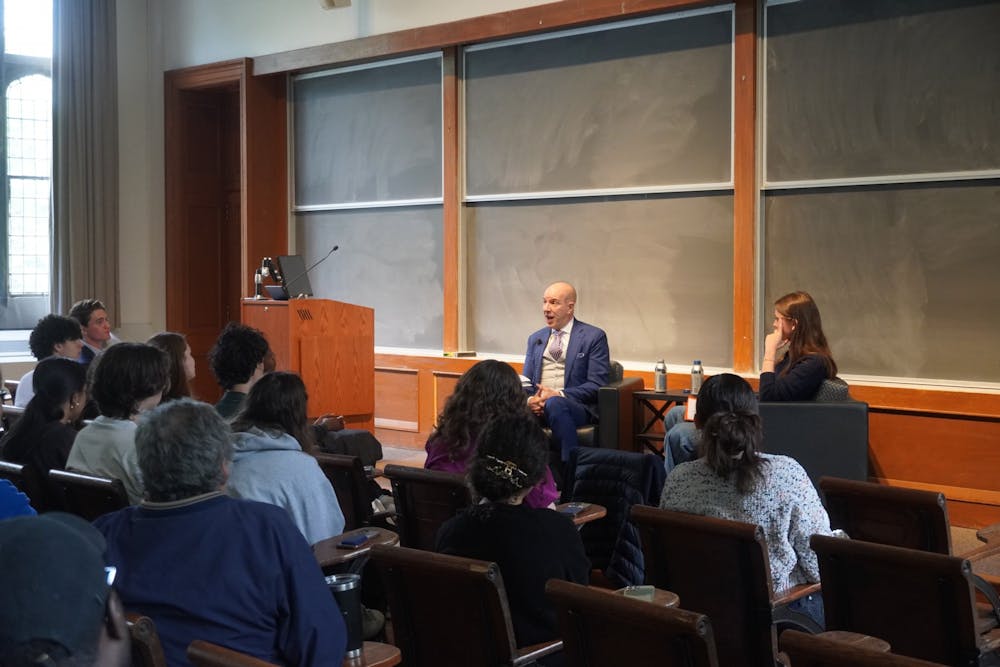Executive Director of the American Civil Liberties Union (ACLU) Anthony Romero ’87 discussed the importance of the First Amendment at the final Princeton Progressive Law Society (PPLS) event of the 2022-23 academic year.
This is the second major event that the group has hosted recently emphasizing the importance of free speech. University President Christopher L. Eisgruber ’83 spoke last week with PPLS advocating for free speech as a progressive value.
At his event last week, Eisgruber emphasized the importance of an open campus dialogue, something he also stressed during the 2022 first-year orientation program.
During the talk, Romero explained that free speech in private settings, such as universities, is a complicated issue, but added that “nonetheless, I think that the default should be about allowing more engagement and more speech.”
PPLS was formed by members of the Class of 2026 in the beginning of the academic year with the support of Professor Martin Flaherty ’81. Besides hosting names such as Romero and Eisgruber, PPLS has also hosted events with Zinelle October, the Executive Vice President of the American Constitution Society, and Thomas Saenz, the President of the Mexican American Legal Defense and Education Fund, and helped to bring Noam Chomsky to campus.
The group is an alternative for legally-interested students to the conservative Federalist Society. Other law-focused groups have also grown in recent years. The Princeton Legal Journal was founded in 2021 and the Princeton Pre-Law Society has been considerably more active in the past school year.
Throughout the talk, Romero repeatedly emphasized the importance of free speech for everyone, including white supremacist groups. He stated, “We defend the rights of Nazis to march. We defend the right of the NRA to exist as a lawful organization … When Donald Trump was deplatformed from Twitter and Facebook, we criticized them.”
“We’re not for the faint of heart,” he said of the ACLU. Romero’s statements come as the ACLU has faced internal debates as to the balance between its role as a group defending free speech from all sides of the political aisle and as an important part of the progressive coalition that took in millions of dollars from progressive donors during the Trump administration.

Romero provided a brief overview of the history of the ACLU including notable cases they brought, such as Loving v. Virginia, which guaranteed the right to interracial marriage, and the Scopes “monkey” trial, which paved the way for evolution to be taught in schools.
Romero said the ACLU, which was founded in 1920, was intersectional “before we knew how to use that word.” He mentioned that the original board included a reserved spot from a representative of the National Association for the Advancement of Colored People (NAACP) and included multiple women, including disability rights advocate Helen Keller.
When discussing his role as executive director, he stated, “I feel like I am the custodian of a national treasure.”
Throughout the conversation, Romero emphasized his belief that freedom of speech cases were the most important work the ACLU did. He discussed the controversy surrounding the ACLU’s representation of white supremacist Jason Kessler, who led the deadly “Unite the Right” march in Charlottesville in 2017, when the city tried to prevent him from protesting.

“There were things I wish I had done differently in Charlottesville. I wish we had asked … Are you bringing guns? Because they came armed to the teeth, these Proud Boys, white supremacists,” he said. “If I had known that they were all gonna be showing up at this march with guns, I maybe would have taken a different stance, because you have the right to carry arms in most of the states … But I don’t have to represent you if you’re going to a protest or a march with a gun.”
“I think guns chill speech,” he added.
He added that as a gay man, he understands the impact of hate speech: “I’m not one of those civil libertarians who says words don’t matter. Words do matter. I can remember every time I have been called a f***** to my face.”
“Nonetheless, I’d rather have a political environment where the contestation of ideas is happening, where harmful words are contradicted with truth, with justice, with kindness, with empathy, with a sense of dignity,” he continued.
Romero also emphasized the benefits freedom of speech for all has on every person, using the example of the use of Brandenburg v. Ohio, a 1969 case that defended the free speech of a Ku Klux Klan leader, as a precedent to defend an organizer of a Black Lives Matter (BLM) protestor who was accused of inciting violence.
Romero further stated that freedom of speech also extends to whistleblowers. “I think overall, most of the laws that criminalize whistleblowers are overly draconian. I think that Edward Snowden is a hero.”
He continued, “Some of the ways in which the government has over prosecuted and criminally penalized people who step forward for wrongdoing … we’ve gone too far in prosecuting it.”
Romero stated that he visited Snowden in Moscow twice, and “kind of cross-examined him” for a few days before deciding to have the ACLU provide him with legal assistance. He explained the ACLU’s policy around protecting people like Snowden.
“If you are a whistleblower who steps forward and asserts that there’s harassment or discrimination, or misuse of funds, we’re going to protect you. And that’s a check and balance on bosses like me. I can’t just pretend that I could do whatever the hell I want,” he said.
He emphasized that the ACLU takes a stance against disinformation, particularly regarding voting information, stating, “It is important for these [social media] platforms not to allow wrongful information to be published, because you can't go back and do a redo of an election.”
Romero also discussed his feelings about the ACLU’s neutrality regarding Supreme Court nominees, stating, “We try to approach it with a level of conservatism in terms of advocacy,” as “the ACLU has had a checkered history on opposing Supreme Court nominees.”
As executive director, Romero “got [his] board to agree to say, let’s get completely out of the business of Supreme Court nominations. Let’s just never opine ever, on any nominee before the Supreme Court.”
“Now, like any good organization that's evolving, we’re thinking about that again,” he added.
Romero concluded the talk, stating that the approach of the ACLU is to “to convince the hearts and minds of people.” The event took place on Friday, May 5 at 2 p.m. in McCosh Hall 38. Vice President of PPLS Giselle Schrier ’26, moderated the town-hall style conversation, and roughly 35 people attended.
According to the PPLS website, the organization has broken for summer recess, and the upcoming events page will be updated after Aug. 20, 2023.
Olivia Sanchez is a staff News writer for the ‘Prince.’
Please send any corrections to corrections[at]dailyprincetonian.com.








